Health is important for a good musician's life
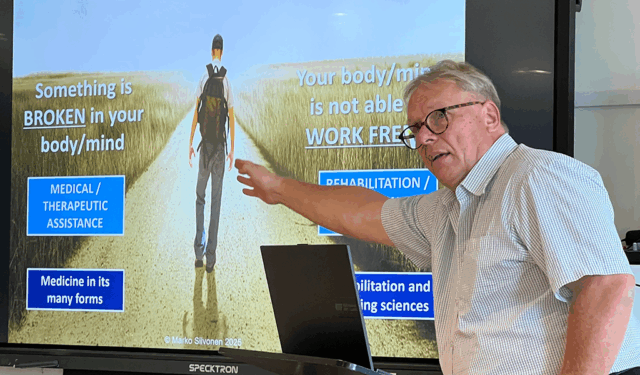
Researchers present new knowledge about health in music. Image: Neuroscientist Marko Siivonen (FI) presents Senso Coaching.
REPORTAGE: The Odeon Music Centre, centrally located in Odense, is buzzing with engaged people in eager conversation. The voices ring out in many different languages as you move around the welcome reception's café tables and buffet with bubbles and snacks. There are northerners, Englishmen, a loud American, Belgians - who speak English with a French accent, Germans - who have replaced the bubbles with beer glasses, a quiet Pole and of course the host country representatives. The Musicians' Health & Performance - 5th Nordic Conference 2025 has kicked off.
Health is essential for lifelong performance
The planning committee's goal is to bridge the gap between research, treatment and education. "We want to share knowledge about challenges and create more openness in the field," says Karen Søgaard, conference organiser and professor of health sciences at SDU. She is busy hanging up analogue conference programmes.
As part of the Music Industry Partnership, the Danish Union of Musicians and Music Educators and the Danish Artist Association support this agenda. Increased health and sustainability in the music industry is important. The truth is that health is a crucial factor in whether you can perform and master your profession - your instrument - physically and mentally throughout your life.
Here at Odeon, MM, DAF, researchers, doctors, therapists, music educators, managers, industry organisations, musicians, students and educational institutions are united around this important agenda.
The conservatory hosts the event
The Royal Danish Academy of Music (SDMK) is hosting the conference with Rector Claus Skjold Larsen as co-organiser. The message in his opening speech in the academy's concert hall earlier this afternoon was clear: musicians' health must be linked directly to music education programmes.
Too many musicians and music educators experience musculoskeletal, hearing, anxiety or stress challenges during their careers. "For the individual, it can feel like an attack on professional identity and be associated with both taboo and self-blame. Many remain silent for fear of being perceived as unemployable," Claus Skjold Larsen told the audience in English.
"Therefore, it is crucial to focus on the fact, that work-related health challenges are far more widespread, than is often thought - and that you are not alone."
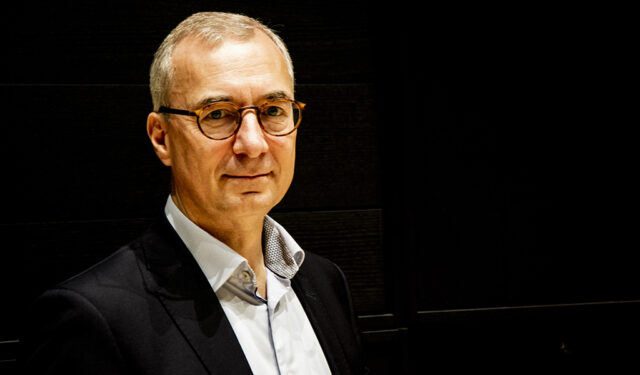
Much can be both prevented and treated, according to SDMK's President.
He sees a big challenge, but also an opportunity, in changing the way we think about practising. Conservatoires have a tradition of demanding a lot of practice time, while doctors warn that excessive strain causes injuries. This is one of the reasons why the Clinic for Musicians' Health at OUH and SDMK have initiated a collaboration. The Clinic for Musicians' Health provides treatment and prevention programmes based on the latest research, and this knowledge is communicated to students - the musicians and music teachers of the future - via the music conservatory.
Musician health at all stages of life
Day two of the conference begins with keynote speaker Jane Ginsborg. Originally trained as an opera singer, as a researcher she has worked to improve musician health in England's nine music conservatoires. With more than 25 years of research behind her, Jane Ginsborg points out that there is a skewed focus when it comes to the different life stages of musicians.
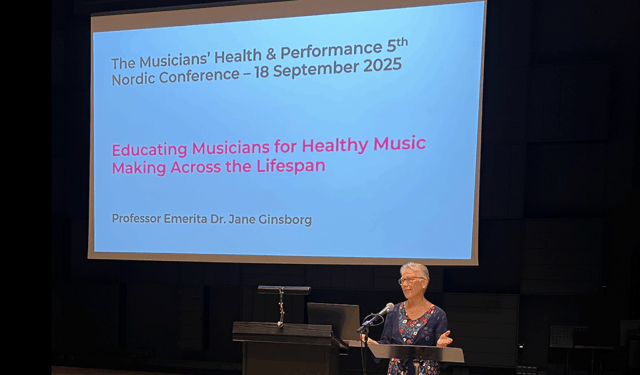
Singer and researcher Jane Ginsborg - Professor Emerita of Music Psychology
Her message is that musician health needs to be improved for musicians at all stages of life. For example, when do musicians stop their career, why, and what happens afterwards?
"If you look at the world of sport, for example dancers, many stop already in their 30s, unlike musicians who continue well into their 60s, even longer. These are the same high performance jobs, so why do people keep going?" researcher Jane Ginsborg asks the conference participants and continues: Is it the meaning of the work? Is it due to freelance work without a pension? Or is it much more about our identity as musicians?
Conference participant and AMR, Anne Cathrine Kielland Lund, said after the presentation: "It was particularly exciting to hear about the many challenges we face in our lifelong journey as musicians, and how we can retire without losing our entire identity."
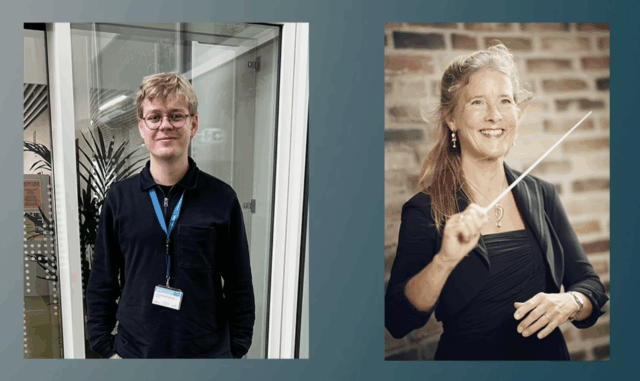
The two musicians, music teachers and health and safety representatives Jacob Djursaa and Anne Cathrine Kielland Lund participated in the conference.
The damage comes later
Later, after the morning coffee, it's all about musicians' specific health challenges. The most common injuries are joint and muscle problems. In Denmark, this accounts for around 85 per cent of the total number of injuries.
A research study by Norwegian Bjørn Hilt shows that pain is a condition for 85 per cent of Norwegian orchestral musicians' daily working lives. Another Norwegian study by Irem Eliassen shows that 8 out of 10 orchestral musicians with pain experience poorer sleep and poorer mental health as a result.
Danish research into musician health by Professor and Head of Department Lars Brandt shows that it is the 40-59 age group that is most often affected by injuries in Denmark. In addition to orchestral instruments, pianists and guitarists are the most commonly injured. Professionally, the musicians with the most injuries are either employed in symphony orchestras, are freelancers or work at music schools. This is according to the latest figures from the Clinic for Musicians' Health at OUH.
"Research shows that many musicians, especially male musicians, come to the clinic far too late when the problem has become entrenched," Professor Lars Brandt concludes the morning's presentation.
Participant Anne Cathrine Kielland Lund, who is an AMR at Kulturskolen Kolding, has experienced first-hand what it means to suffer a serious physical work injury. "I had surgery for carpal tunnel syndrome in both wrists back in 1994. It was during my final years at the conservatory, while I had a permanent contract as a janissary in the Prince's Music Corps. I had two successful operations."
Work-life balance is important for freelancers
"I feel that the most well-documented research at the conference is about orchestral musicians, and less about freelancers and music educators," says musician and music educator Jacob Djursaa during lunch.
The Danish Union of Musicians and Music Educators and the Danish Union of Artists see a labour market that is undergoing major changes. Freelancers, music educators and artists have a complex working life that has only become more demanding and complex to operate in. Work-life balance is important in this often self-directed working life.
Musician and music teacher Anne Cathrine Kielland Lund recognises the high workload as a long-time musician/conductor in several orchestras and music school and MGK teaching. "I work all the time," she says.
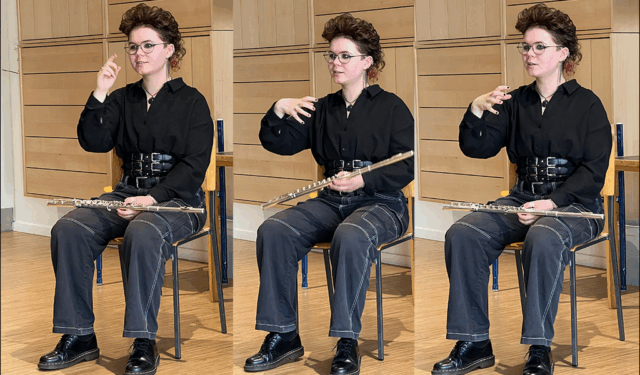
Musician Ida Trøborg tests Senso Coaching's methods in a workshop.
It doesn't have to hurt before it feels good
"Senso Coaching as Support for Musicians' Health - it's Erja Joukamo-Ampuja and Marko Siivonen from Finland. Absolutely amazing - you have to experience it!" A welcome tip from conference participant and symphony orchestra musician Tone Sundgård Anker for the afternoon conference programme.
In the workshop room, test subject and flautist Ida Trøjgaard sits ready, while sports coach Marko Siivonen explains the background of Senso Coaching to the workshop participants. "The same instructions on posture and grip, for example, don't work equally well for everyone." Then Erja Joukamo-Ampuja, a teacher at the Sibelius Academy, takes over. "I use Senso Coaching to help students find and refine their optimal playing posture. This results in effective support and more relaxed breathing," she says.
The goal is to lower the risk of injury. Physical strain is reduced through a more individualised posture, which enables faster recovery.
MGK student Ida Trøjgaard first plays music in her usual sitting position. Then Erja Joukamo-Ampuja adjusts the musician's posture based on a personal test profile of Ida Trøjgaard that she has previously conducted.
Ida is playing again, and now the sound and musical expression have magically changed. The sound has become more beautiful with more nuances and more open. The music also flows more effortlessly. Ida Trøjgaard explains afterwards that flautists work with something they call "a hot potato". "We do it to open up the airflow more," she explains. In her old posture, Ida found that she was using more effort to push the airflow forward. "Now it's more like the airflow just flows out of me"
Senso Coaching as Support for Musicians' Health
Senso Coaching has been used in sports and corporate coaching since the 1990s. The goal is to improve performance and optimise recovery.
Senso Coaching's theoretical foundation is functional neuroscience. There are four basic types of nervous systems. The details of each type's optimal posture (spinal curve, jaw position, arm placement, movement paths, centre of gravity) are more individualised than what is typically taught.
Source: Erja Joukamo-Ampuja, Senso Coach, horn player and teaches at the Sibelius Academy and Marko Siivonen, sport coach, Finland
More musician health on the agenda
The second day of the conference is coming to an end and Jacob Djursaa concludes that musician health is something that needs more focus locally. "You could start by putting it on the agenda at a teachers' meeting." Jacob Djursaa is also interested in how to focus on community and thus mental health in music schools.
"I was particularly interested in the work of neuroscientist Marko Siivonen and horn player Erja Joukamo-Ampuja. It was both exciting and groundbreaking," says Anne Cathrine Kielland Lund.
The conference has strengthened her understanding of the importance of looking after the whole person behind the musician. "Right from the early music lessons in music school, we need to make our students even more conscious and involve the body. "The old cliché that 'it has to hurt before it feels good' should not be allowed to live on!"
Text: David Efraim Poulsen - Media Editor at Musicians and Music Educators Union.

